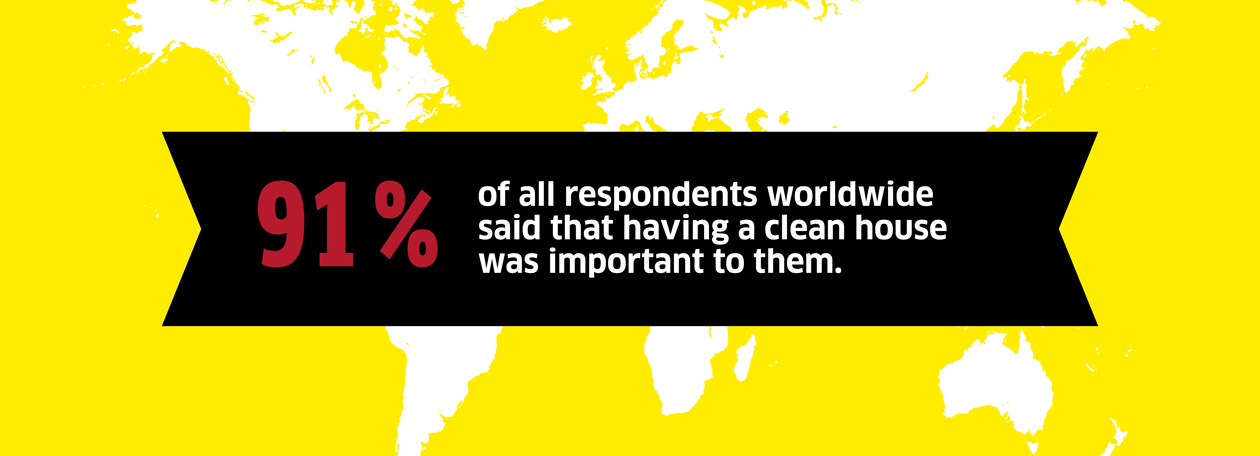"Everyone likes it clean"

However, an international comparison of cleaning habits shows surprising differences
The world has one thing in common as far as cleaning is concerned: a clean home is important or very important to almost everyone. This shows that household cleaning, whether regularly or irregularly, is simply part of life. But what precisely is behind all this? Who spends the most time cleaning and what aids are used most frequently for cleaning? Kärcher, as a specialist for cleaning devices, wanted to find out more and conducted a representative survey together with market researchers from Research Now. More than 6,000 participants from Brazil, China, Germany, France, Poland and the USA were surveyed with regard to their personal cleaning behaviour. It emerged that there were some similarities, but also differences and peculiarities typical for the country.
Cleanliness is particularly important to Brazilians, Poles are more generous
Around 90% of those surveyed worldwide said that a clean home was important or very important. In Brazil, 97% of those surveyed said that cleanliness was important; in Poland, this was 87%. The other countries surveyed lie between these figures. By comparison, the Germans, who are regarded worldwide as being particularly clean, are somewhere at the bottom of the scale with 89%. When asked how much time they spent cleaning weekly, on average German households replied 3 hours and 17 minutes. Accordingly, the Germans come close to the other countries surveyed (3 hours 20 minutes). In Brazil, an average of 4 hours 5 minutes are spent cleaning, just under 10% of those surveyed said that they spent more than 10 hours cleaning.

Interview: Where is it the cleanest?
We discussed the partly astounding results and differences with Gerhard Reifmesser, Head of Kärcher Market Research.
Mr Reifmesser, would you say that those who spend more time cleaning have a cleaner home?
That would be too simplistic. The amount of time spent cleaning depends on the devices used. Using electrical devices can save time. A typical peculiarity of the cleaning culture in Brazil is, among other things, that cleaning takes place manually using large amounts of water. Houses typically have stone floors and the kitchen often opens to one side on to a type of terrace, the so-called Lavanderia. This allows the kitchen floor to be washed and cleaned. Noticeable are also the powerful and fragranced detergents – a fresh scent signals cleanliness.
Are you aware of the global cleaning cultures and their differences based on your own experience?
Yes, we market researchers conduct virtually all of our studies locally, speak to people, look at their homes and how they clean. I spend about a quarter of my working time conducting such studies in the global markets for our products.
In your opinion, which country is the cleanest?
Japan. In this respect, the Japanese have a different mentality. Cleaning is a part of character building. Schoolchildren and students learn to clean their school themselves. An adult who keeps their surroundings clean is regarded as a person who is at peace with themselves. The community also plays a special role. On Sundays, one can see many volunteers cleaning public facilities and collecting refuse. There is nothing like it elsewhere.
In addition to cultural differences, are there also fundamental similarities in cleaning habits?
To put it simply: everyone likes it clean. However, the perception of cleanliness is individually and culturally influenced. In the UK, Russia or the USA, the cleaning behaviour of a typical Japanese household is perceived as greatly exaggerated.
And how clean are the Germans?
If one considers the average time spent cleaning in a German household, we are somewhere in the bottom third. That Germany is very clean and tidy, is more of a cliché than reality. Think about spring cleaning: it was once a common ritual that has virtually disappeared. However, as I already mentioned, it depends on the cleaning devices used. German households are above average when it comes to using electrical household appliances.
And the Japanese who are known to love technology?
This is where a further Japanese peculiarity comes into play: the cramped living conditions. Even in the Chinese market that we surveyed, more living space is available on average. Japanese dwellings are small, often narrow and distributed over several floors. In Japan, battery-powered devices are preferred. Due to a lack of storage space, these are usually stored where they are visible. This places different demands on the product design. Kärcher has therefore already developed several products that were specifically adapted to suit Japanese habits.
How much time do you personally spend cleaning your home per week?
I think this is somewhere within the German average. However, my wife says that she occasionally has to carry on cleaning when I have finished. Incidentally, this too is a global phenomenon: men are sharing the housework to an increasing extent, but women still feel as if they are mainly responsible for this task.

